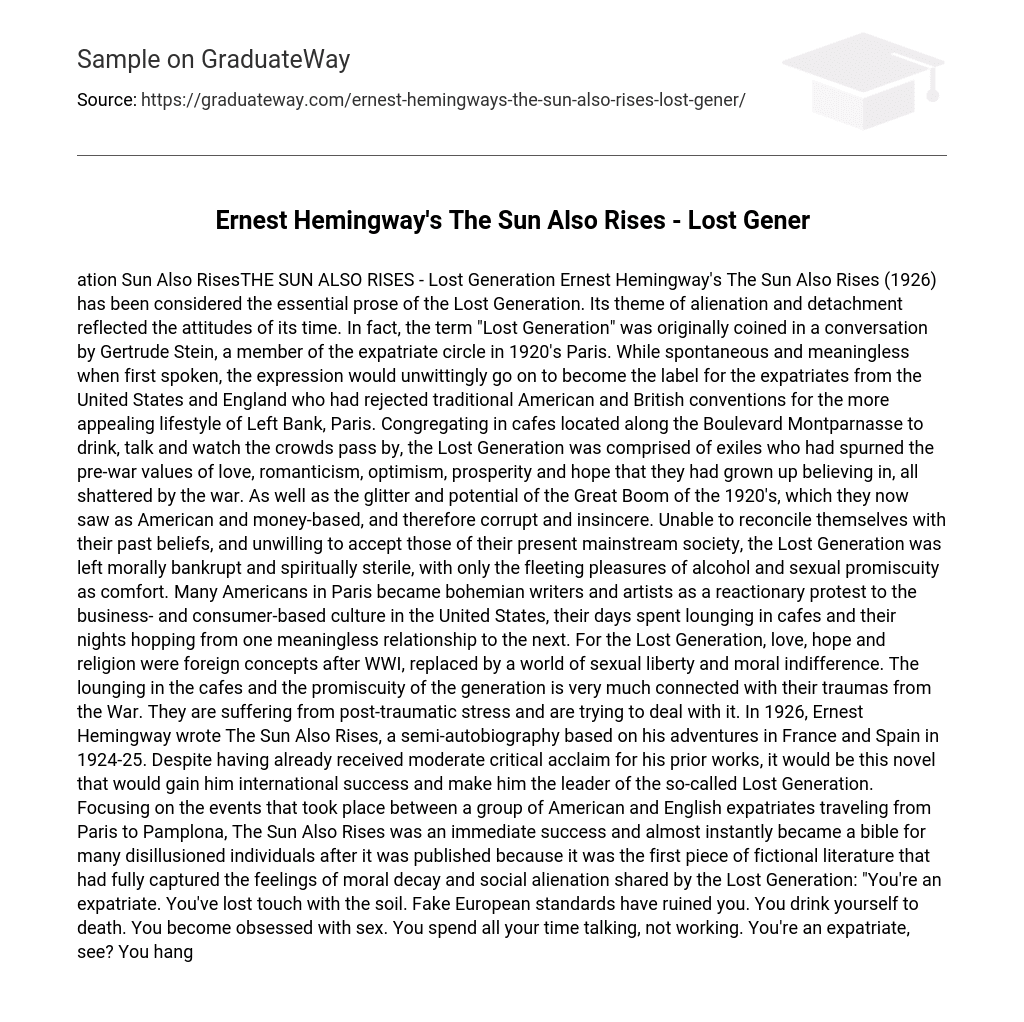The Sun Also Rises (1926) has been considered the essential prose of the Lost Generation. Its theme of alienation and detachment reflected the attitudes of its time. In fact, the term “Lost Generation” was originally coined in a conversation by Gertrude Stein, a member of the expatriate circle in 1920’s Paris. While spontaneous and meaningless when first spoken, the expression would unwittingly go on to become the label for the expatriates from the United States and England who had rejected traditional American and British conventions for the more appealing lifestyle of Left Bank, Paris. Congregating in cafes located along the Boulevard Montparnasse to drink, talk and watch the crowds pass by, the Lost Generation was comprised of exiles who had spurned the pre-war values of love, romanticism, optimism, prosperity and hope that they had grown up believing in, all shattered by the war. As well as the glitter and potential of the Great Boom of the 1920’s, which they now saw as American and money-based, and therefore corrupt and insincere. Unable to reconcile themselves with their past beliefs, and unwilling to accept those of their present mainstream society, the Lost Generation was left morally bankrupt and spiritually sterile, with only the fleeting pleasures of alcohol and sexual promiscuity as comfort.
Many Americans in Paris became bohemian writers and artists as a reactionary protest to the business- and consumer-based culture in the United States, their days spent lounging in cafes and their nights hopping from one meaningless relationship to the next. For the Lost Generation, love, hope and religion were foreign concepts after WWI, replaced by a world of sexual liberty and moral indifference. The lounging in the cafes and the promiscuity of the generation is very much connected with their traumas from the War. They are suffering from post-traumatic stress and are trying to deal with it. In 1926, Ernest Hemingway wrote The Sun Also Rises, a semi-autobiography based on his adventures in France and Spain in 1924-25. Despite having already received moderate critical acclaim for his prior works, it would be this novel that would gain him international success and make him the leader of the so-called Lost Generation. Focusing on the events that took place between a group of American and English expatriates traveling from Paris to Pamplona, The Sun Also Rises was an immediate success and almost instantly became a bible for many disillusioned individuals after it was published because it was the first piece of fictional literature that had fully captured the feelings of moral decay and social alienation shared by the Lost Generation: “You’re an expatriate. You’ve lost touch with the soil. Fake European standards have ruined you.
You drink yourself to death. You become obsessed with sex. You spend all your time talking, not working. You’re an expatriate, see? You hang around cafes.” The satirical portrayal of the Robert Cohn, the last chivalric hero and defender of an outworn faith, and his absurd willingness to endure public humiliation for Lady Brett Ashley’s unforthcoming affection, served only to reinforce the Lost Generation’s belief that love had died in WWI, as did all the other pre-war values that Cohn unwaveringly stood for. While tragic in that the source of Cohn’s persecution came exclusively from those who simply could not understand his obstinately idealistic outlook, the fact that his mere existence was nonetheless a painful reminder to the expatriates of America’s betrayal was enough to justify their racist and spiteful actions. It was also the universal quality of Hemingway’s other characters, which reflected every type of individual in the Lost Generation from the defeated exiles who had accepted their empty, meaningless lives to the expatriates who had acknowledged the moral and spiritual decline of society but were unwilling to surrender themselves to the hollow existence that it offered, and the actions of these individuals that made The Sun Also Rises so appealing to its audience. While some readers found themselves in the characters of Bill Gorton, Mike Campbell and Count Mippipopolous, who had resigned their lives to ethical stagnancy and the superficial pleasures of cynical humour, casual indifference and expensive wine, many others associated with the characters of Lady Brett Ashley and Jake Barnes, the American expatriate whom Hemingway had originally based on himself.
Jake’s quest to rediscover his moral bearings through his pilgrimage to Burguete and Pamplona, he tries to built up a new set of values during the novel and more or less establishes a new elite of people who are “in” or “out”, as well as Brett’s moral redemption in the final act at Madrid, were echoed by the thousands of expatriates in Europe who were desperate to find their lost hope and values. Furthermore, unlike his passive companions, Jake’s unwillingness to accept his disconnection from God (“I was a little ashamed, and regretted that I was such a rotten Catholic, but realized there was nothing I could do about it, at least for a while. I only wished I felt religious and maybe I would the next time.”) and his inability to love (“Oh, Jake, we could have had such a damned good time together.” “Yes, isn’t it pretty to think so?”), was a source of inspiration for Hemingway’s generation, a sign that there was a possibility of salvation for a group that seemed destined to be lost forever.
Bibliography
- Hemingway, Ernest The Sun Also Rises. New York. Bloom, Harold. Ernest Hemingway.
- New York: Chelsea House Publishers, 1985.Noble,
- Donald R. Hemingway: A Revaluation. New York: The Whitston Publishing Company, 1983. Svoboda, Frederic J.
- Hemingway and The Sun Also Rises: The Crafting of a Style. Kansas: The University Press of Kansas, 1983.





